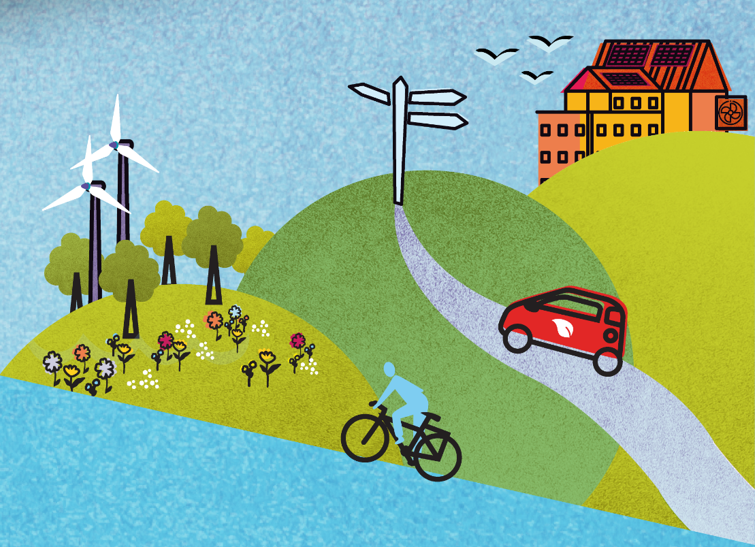The recent publications of both The Status of Ireland’s Climate, 2020 report1 and the first instalment of the IPCC Sixth Assessment, “Climate Change 2021: The Physical Science Basis”2 have highlighted the scale, the unambiguity and the urgency of the climate change emergency.
Echoing COP26’s call for action by UN Secretary-General, António Guterres and highlighting Met Éireann’s contribution to Ireland’s Climate Action Plan 2021 published yesterday, Met Éireann’s Director, Eoin Moran, said:
“To avoid the worst impacts of human caused climate change, all countries must now quickly decarbonise through strong, rapid and sustained reduction of greenhouse gas emissions. The 2020s are a crucial decade to address this significant challenge. To support this effort, Met Éireann will continue to work with all its partners to support climate action to help achieve a climate resilient and climate neutral Ireland.”
Met Éireann’s ongoing work in support of the Climate Action Plan 2021 and to achieve a climate resilient and climate neutral Ireland includes:
- Informing climate change policy by implementing a climate science programme to understand, analyse and model Ireland’s past, current and future climate and disseminating its outputs;
- Supporting climate change impact planning and decision-making by developing and coordinating climate services (i.e. knowledge and tools needed for users to make decisions on climate impacts);
- Monitoring Ireland’s climate by delivering advanced, sustainable and long-term climate and environmental monitoring programmes;
- Supporting national climate action capability and capacity building by coordinating climate-related working groups (e.g. GCOS) and implementing a weather and climate research programme;
- Supporting the National Flood Forecasting Warning Service (NFFWS) by building flood forecasting capability;
- Supporting the National Emergency Management during extreme weather events.
To deliver on the Climate Action Plan 2021 in the area of climate science, Met Éireann will:
- continue to improve the understanding of and the communication around Ireland’s changing climate and deliver, for example, state of the art climate modelling;
- continue to enable the delivery and continuous improvement of national predictive capability and capacity in the areas of weather, climate and hydrology and deliver, for example, competitive project and individual fellowship funding to support climate change research;
- continue its leadership role in coordinating and supporting national capability and capacity in earth, ocean and atmospheric science and deliver, for example, Ireland’s Global Climate Observing System (GCOS) activities.
- continue to improve Ireland’s national climate monitoring capabilities through the delivery of advanced, sustainable and long-term climate and environmental monitoring programmes and deliver, for example, 81 automated climate monitoring stations in 2022.
To deliver on the Climate Action Plan 2021 in the area of climate adaptation, Met Éireann will:
- continue to develop flood forecasting capability including the development of coastal and marine monitoring and predictive capability and deliver, for example, fluvial (river) flood forecasting capability in the context of increased flooding risk related to climate change;
- develop climate services in support of climate change impact planning and decision-making and deliver, for example, the TRANSLATE project to support coherent, national sectoral adaptation planning on the basis of standardised national climate projections and information.
- initiate the coordination of Ireland’s provision of integrated, tailored and user-orientated climate services across all relevant sectors to support decision-making processes and achieve resilience in the face of increased climate risks.
To deliver on the Climate Action Plan 2021 in the area of climate action, Met Éireann will:
- support the retrofitting scheme in particular and building adaptation in general by developing specific climate maps and data for use in building design and deliver, for example, building standard’s short duration rainfall and driving rain intensity maps;
- continue to support the National Emergency Management during extreme weather events and deliver, for example, impact based decision making products and services for weather events in general and extreme weather events in particular.
The Department of Housing, Local Government and Heritage’s press release can be found here.
The main Climate Action Plan 2021 page can be found here.
1
* The annual average surface air temperature in Ireland has increased by over 0.9°C over the last 120 years, with a rise in temperature being observed in all seasons.
* Annual precipitation was 7% higher in the period 1991 to 2020, compared to the 30 year period 1961 to 1990.
* There is an increase in river flows across most of Ireland since the early 70s. However, there is evidence in recent years of an increase in potential drought conditions especially in the East.
* Sea level around Ireland has risen by approximately 2 – 3mm per year since the early 1990s.
2
Unless there are immediate, rapid and large-scale reductions in greenhouse gases (GHG) emissions, limiting warming close to 1.5°C or even 2°C will be beyond reach. For 1.5°C of global warming, there will be increasing heat waves, longer warm seasons and shorter cold seasons as well as changes in precipitation patterns affecting flooding and drought occurrences. At 2°C of global warming, heat extremes would more often reach critical tolerance thresholds for agriculture and health.
